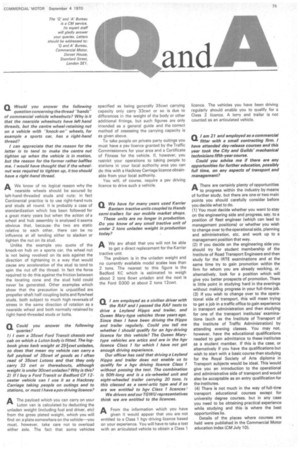a am 21 and employed as a commercial fitter with a
Page 77

If you've noticed an error in this article please click here to report it so we can fix it.
small contracting firm. I have attended day-release courses and this year took the City and Guilds' mechanical technicians fifth-year course.
Could you advise me if there are any opportunities for further education, possibly full time, on any aspects of transport and management?
AThere are certainly plenty of opportunities
to progress within the industry by means of further study. but there are one or two main points you should carefully consider before you decide what to do.
(1) You must decide whether you want to stay on the engineering side and progress, say. to a position of fleet engineer (which can lead to management positions) or whether you wish to change over to the operational side. planning and administration, etc. and work up to a management position that way.
(2) If you decide on the engineering side you should try for student membership of the Institute of Road Transport Engineers and then study for the IRTE examinations and at the same time try to gain promotion within the firm for whom you are already working, or, alternatively, look for a position which will give you better prospects of promotion. There is little point in studying hard in the evenings without making progress in your full-time job.
(3) If you wish to change over to the operational side of transport, this will mean trying to get a job in a traffic office to gain experience in transport administration and then studying for one of the transport institutes' examinations (such as the Institute of Transport of the Institute of Traffic Administration) by attending evening classes. You may not, however, have the educational qualifications needed to gain admittance to these institutes as a student member. If this is the case, or alternatively if you have the qualifications but wish to start with a basic course then studying for the Royal Society of Arts diploma in Transport subjects would be ideal. This Would give you an introduction to the operational and administrative side of transport and would also be acceptable as an entry qualification for the institutes.
(4) There is not much in the way of full-time transport educational courses except for university degree courses, but in any case you need to be obtaining practical experience while studying and this is where the best opportunities lie.
Details of the places where courses are held were published in the Commercial Motor education index (CMJuly 10).




























































































































